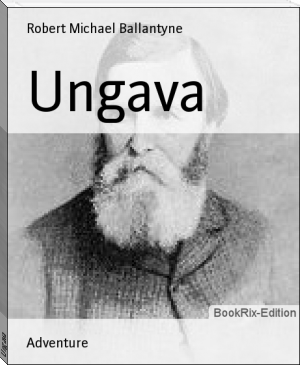Ungava by Robert Michael Ballantyne (new reading TXT) 📖

- Author: Robert Michael Ballantyne
Book online «Ungava by Robert Michael Ballantyne (new reading TXT) 📖». Author Robert Michael Ballantyne
Meanwhile the tide rose, the power of the current was gradually checked, and towards noon they passed the dangerous narrows in safety. From the view that was now obtained of the interior, it became evident that the worst of their journey yet lay before them. On arriving at the mouth of Deer River, the mountains were seen to rise abruptly and precipitously, while far away inland their faint blue peaks rose into the sky. Indeed from this point the really hard work of the voyage may be said to have commenced; for scarcely had they proceeded a few miles up the river, when their further progress, at least by water, was effectually interrupted by a rapid which came leaping madly down its rocky bed, as if the streams rejoiced to escape from the chasms and mountain gorges, and find rest at last on the ample bosom of the great deep.
"What think ye of that, boy?" said Stanley to Frank Morton, as they leaped from their respective canoes, and stood gazing at the rugged glen from which the rapid issued, and the wild appearance of the hills beyond. "It seems to me that report spoke truly when it said that the way to Clearwater Lake was rugged. Here is no despicable portage to begin with; and yonder cliffs, that look so soft and blue in the far distance, will prove to be dark and hard enough when we get at them, I warrant."
"When we get at them!" echoed Mrs Stanley, as she approached, leading Edith by the hand. "Get at them, George! Had any one asked me if it were possible to pass over these mountains with our canoes and cargoes, I should have answered, `Decidedly not!'"
"And yet you were so foolish and reckless as to be the first to volunteer for this decidedly impossible expedition!" replied Stanley.
"There you are inconsistent," said Mrs Stanley, smiling. "If reckless, I cannot be foolish, according to your own showing; for I have heard you give it as your opinion that recklessness is one of the most essential elements in the leaders of a forlorn hope. But really the thing does seem to my ignorant mind impossible.--What think you, Eda?"
Mrs Stanley bent down and looked into the face of her child, but she received no reply. The expanded eyes, indeed, spoke volumes; and the parted lips, on which played a fitful, exulting smile, the heightened colour, and thick-coming breath, told eloquently of her anticipated delight in these new regions, which seemed so utterly different from the shores of the bay: but her tongue was mute.
And well might Mrs Stanley think the passage over these mountains impossible; for, except to men accustomed to canoe travelling in the American lakes and rivers, such an attempt would have appeared as hopeless as the passage of a ship through the ice-locked polar seas in winter.
Not so thought the men. Already several of the most active of them were scrambling up the cliffs with heavy loads on their backs; and, while Stanley and his wife were yet conversing, two of them approached rapidly, bearing the large canoe on their shoulders. The exclamation that issued from the foremost of these proved him to be Bryan.
"Now, bad luck to ye, Gaspard! can't ye go stidy? It's mysilf that'll be down on me blissid nose av ye go staggerin' about in that fashion. Sure it's Losh, the spalpeen, that would carry the canoe better than you."
Gaspard made no reply. Bryan staggered on, growling as he went, and in another minute they were hid from view among the bushes.
"What do you see, Frank?" inquired Stanley; "you stare as earnestly as Bryan did at the white bear last week. What is't, man? Speak!"
"A fish," replied Frank. "I saw him rise in the pool, and I'm certain he's a very large one."
"Very likely, Frank; there ought to be a fish of some sort there. I've been told--hist! there he's again. As I live, a salmon! a salmon, Frank! Now for your rod, my boy."
But Frank heard him not, for he was gone. In a few minutes he returned with a fishing-rod, which he was busily engaged in putting up as he hurried towards the rocks beside the pool.
Now, Frank Morton was a fisher. We do not mean to say that he was a fisher by profession; nor do we merely affirm that he was rather fond of the gentle art of angling, or generally inclined to take a cast when he happened to be near a good stream. By no means. Frank was more than that implies. He was a steady, thorough-going disciple of Izaak Walton; one who, in the days of his boyhood, used to flee to the water-side at all seasons, in all weathers, and despite all obstacles. Not only was it his wont to fish when he could, or how he could, but too often was he beguiled to fish at times and in ways that were decidedly improper; sometimes devoting those hours which were set apart expressly for the acquirement of Greek and Latin, to wandering by mountain stream or tarn, rod in hand, up to the knees in water, among the braes and woodlands of his own native country. And Frank's enthusiasm did not depend entirely on his success. It was a standing joke among his school-fellows that Frank would walk six miles any day for the chance of a nibble from the ghost of a minnow. Indeed he was often taunted by his ruder comrades with being such a keen fisher that he was quite content if he only hooked a drowned cat during a day's excursion. But Frank was good-natured; he smiled at their jests, and held on the even tenor of his way, whipping the streams more pertinaciously than his master whipped _him_ for playing truant; content alike to bear ignominy and chastisement, so long as he was rewarded by a nibble, and overjoyed beyond expression when he could return home with the tail of a two-pounder hanging over the edge of his basket. Far be it from us to hold up to ridicule the weakness of a friend, but we cannot help adding that Master Frank made the most of his tails. His truthful and manly nature, indeed, would not stoop to actual deception, but he had been known on more than one occasion to offer to carry a friend's waterproof fishing-boots in his basket, when his doing so rendered it impossible to prevent the tails of his trout from protruding arrogantly, as if to insinuate that there were shoals within. Another of Frank's weaknesses was, upon the hooking of every fish, to assert, with overweening confidence and considerable excitement, that it was a tremendously big one. Experience had, during all his piscatorial career, contradicted him ninety-nine times out of every hundred; but Frank's firm belief in his last minnow being a big trout--at least until it lay gasping on the bank at his feet--was as unshaken after long years of mistaken calculation as when first he sallied forth to the babbling brook with a willow branch, a fathom of twine, and a crooked pin!
Such untiring devotion, of course, could not fail to make Frank particularly knowing in all the details and minutiae of his much-loved sport. He knew every hole and corner of the rivers and burns within fifteen miles of his father's house. He became mysteriously wise in regard to the weather; knew precisely the best fly for any given day, and, in the event of being unhappily destitute of the proper kind, could dress one to perfection in ten minutes. As he grew older and taller, and the muscles on his large and well-made limbs began to develop, Frank slung a more capacious basket on his back, shouldered a heavier rod, and, with a pair of thick shoes and a home-spun shooting suit, stretched away over the Highland hills towards the romantic shores of the west coast of Scotland. Here he first experienced the wild excitement of salmon-fishing; and here the Waltonian chains, that had been twining and thickening around him from infancy, received two or three additional coils, and were finally riveted for ever. During his sojourn in America, he had happened to dwell in places where the fishing, though good, was not of a very exciting nature; and he had not seen a salmon since the day he left home, so that it is not matter for wonder that his stride was rapid and his eye bright while he hurried towards the pool, as before mentioned.
He who has never left the beaten tracks of men, or trod the unknown wilderness, can have but a faint conception of the feelings of a true angler as he stands by the brink of a dark pool which has hitherto reflected only the antlers of the wild deer--whose dimpling eddies and flecks of foam have been disturbed by no fisher since the world began, except the polar bear. Besides the pleasurable emotions of strong hope, there is the additional charm of uncertainty as to what will rise, and of certainty that if there be anything piscatine beneath these fascinating ripples it undoubtedly _will_ rise--and bite too! Then there is the peculiar satisfaction of catching now and then a drop of spray from, and hearing the thunder of, a cataract, whose free, surging bound is not yet shackled by the tourist's sentimental description; and the novelty of beholding one's image reflected in a liquid mirror whose geographical position is not yet stereotyped on the charts of man. Alas for these maps and charts! Despite the wishes of scientific geographers and the ignorance of unscientific explorers, we think them far too complete already; and we can conceive few things more dreadful or crushing to the enterprising and romantic spirits of the world than the arrival of that time (if it ever shall arrive) when it shall be said that _terra incognita_ exists no longer--when every one of those fairy-like isles of the southern seas, and all the hidden wonders of the polar regions, shall be put down, in cold blood, on black and white, exposed profanely on the schoolroom walls, and drummed into the thick heads of wretched little boys who don't want to learn, by the unsympathising hands of dominies who, it may be, care but little whether they do or not!
But to return. While Frank stood on the rocks, attaching to the line a salmon-fly which he had selected with much consideration from his book, he raised his eyes once or twice to take a rapid glance at his position and the capabilities of the
 Nowadays a big variety of genres are exist. In our electronic library you can choose any book that suits your mood, request and purpose. This website is full of free ebooks. Reading online is very popular and become mainstream. This website can provoke you to be smarter than anyone. You can read between work breaks, in public transport, in cafes over a cup of coffee and cheesecake.
Nowadays a big variety of genres are exist. In our electronic library you can choose any book that suits your mood, request and purpose. This website is full of free ebooks. Reading online is very popular and become mainstream. This website can provoke you to be smarter than anyone. You can read between work breaks, in public transport, in cafes over a cup of coffee and cheesecake.




Comments (0)